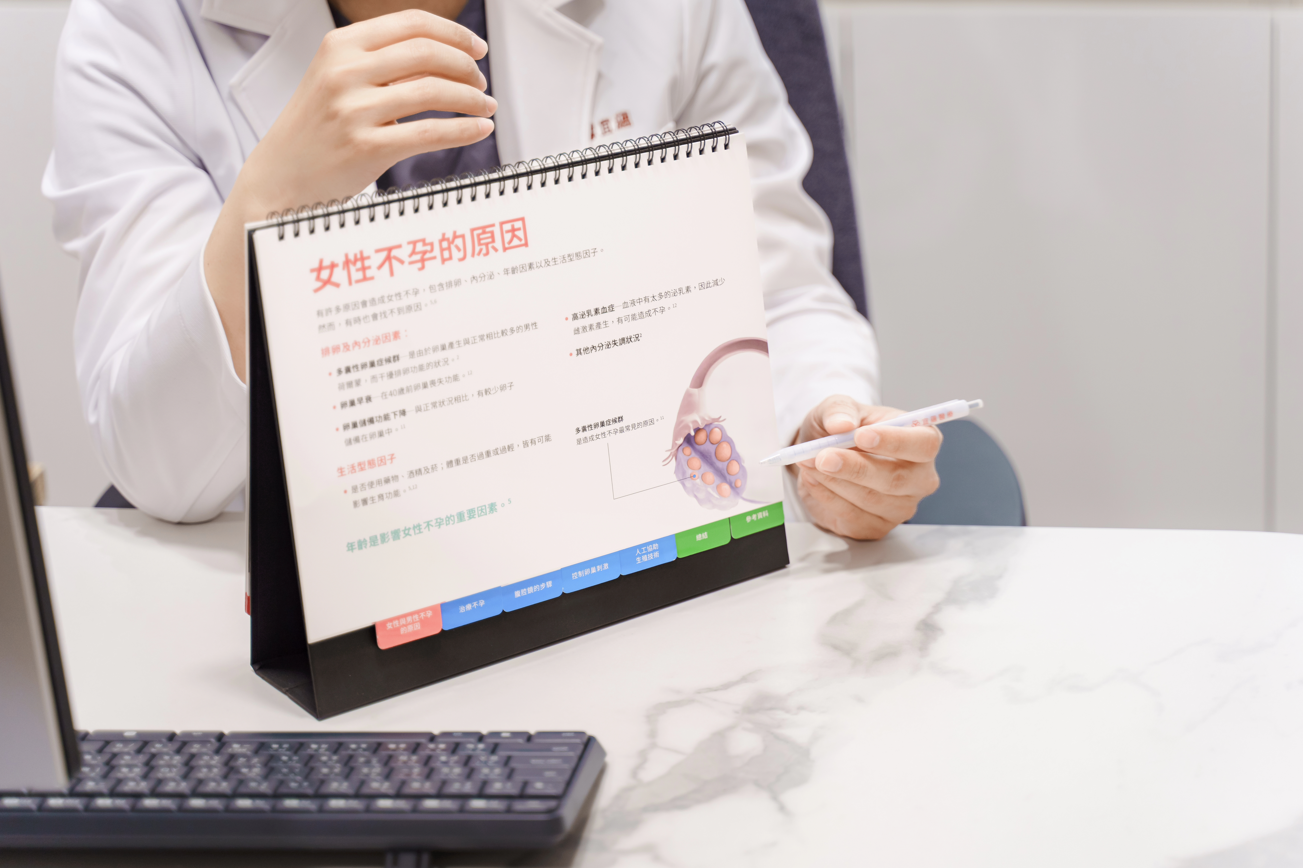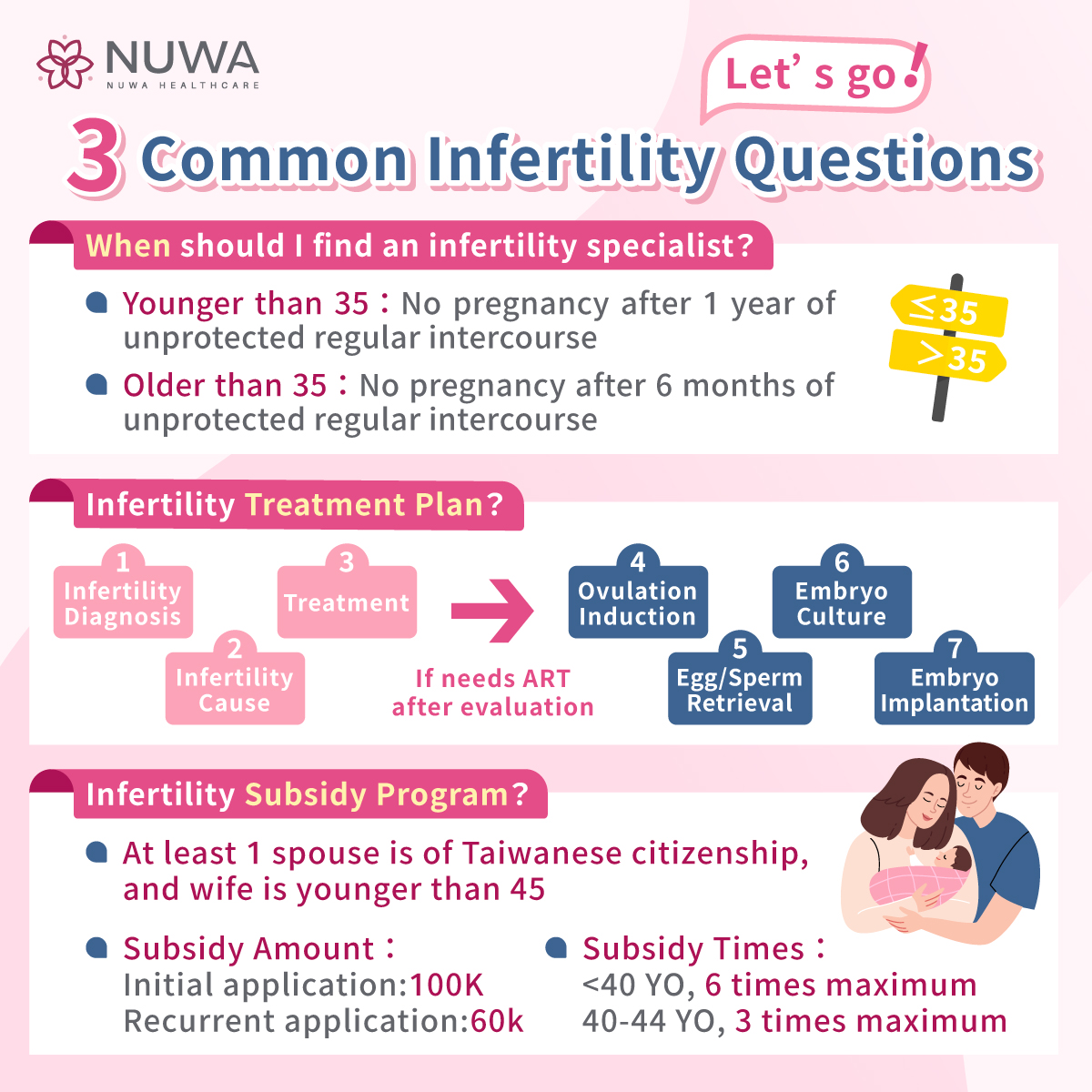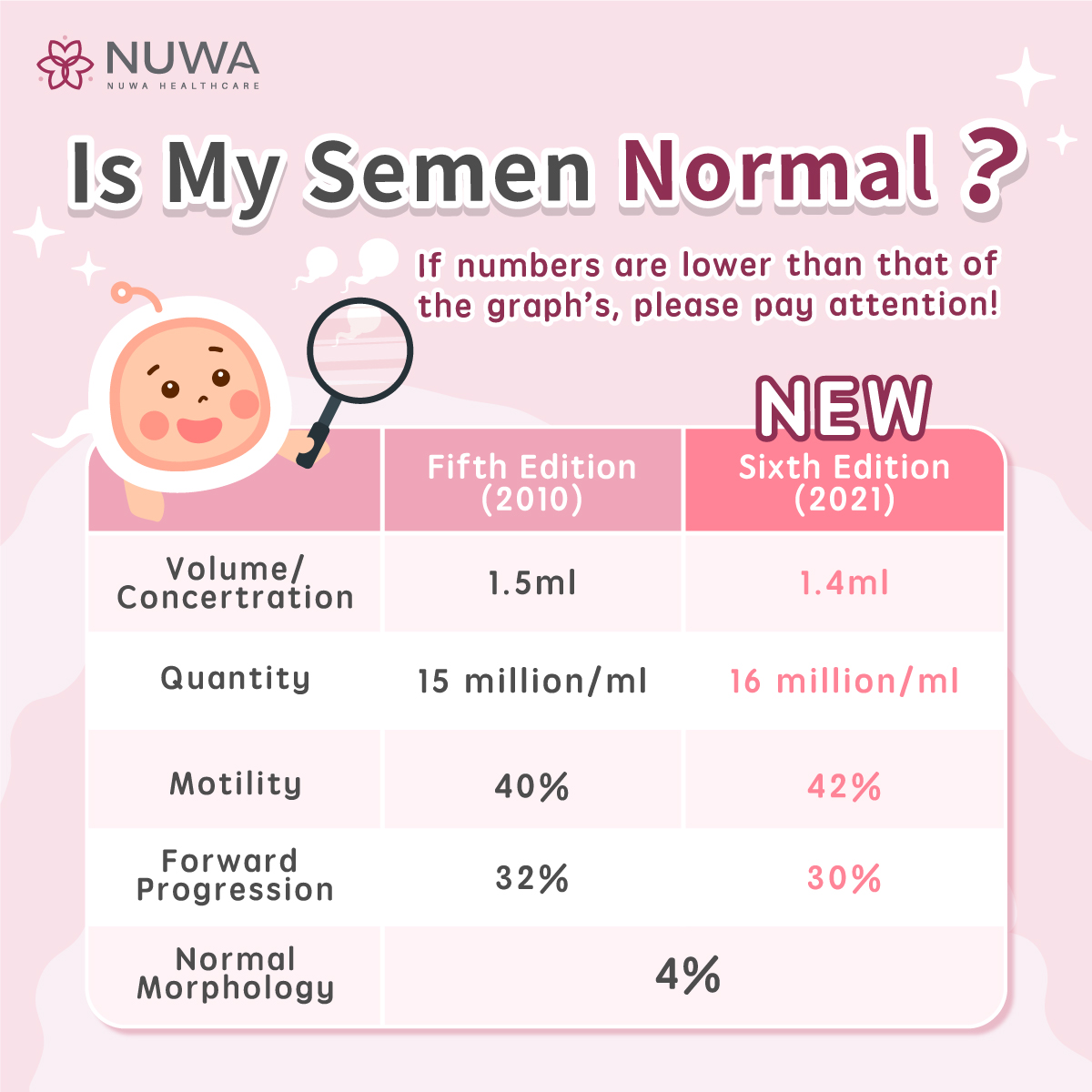
Resources
- Home
- Resources
- Fertility Resources
- Understanding Infertility: Taking Control
Understanding Infertility: Taking Control
Share
What should I do if I have infertility? What is the definition of “infertility”? You can find the answers by undergoing infertility examinations! According to The Ministry of Health and Welfare, 1 in every 7 couples has infertility in Taiwan, and that adds to the confusion and frustration on top of everything else. This article will clearly state the different infertility examinations for both men and women, as well as different costs and procedures. You’ll understand all the different terms and procedures by the end of this article! 




The Definition of Infertility
Do you know the criteria for infertility? When should you seek medical help? Usually, infertility can be classified into 2 situations below:
➜ Younger than 35 years old
If you are younger than 35 years old and have still not gotten pregnant within a year of routine sexual intercourse without protection (2-3 times per week as routine), it will qualify as infertility.
➜ Older than 35 years old
If you are older than 35 years old and have still not gotten pregnant within 6 months of sexual intercourse without protection, it will qualify as infertility.
If you meet the above criteria and have fertility plans, it is recommended that you seek professional help from an infertility doctor as soon as possible.
Which Department Should I Go for Infertility Examinations?

If it is confirmed that you have infertility, which department or specialist should you go to? Once a couple realizes infertility might be in play, it is recommended to go to either an OBGYN (obstetrics and gynecology) or a reproductive medicine department for a professional evaluation and diagnosis. The doctor will evaluate the situation and recommend appropriate tests and examinations to find out the cause of the couple’s infertility.
Extended Reading: An Introduction to NUWA Fertility Center’s Reproductive Medicine Treatment
Infertility Examinations At A Glance
A lot of people think that being diagnosed with infertility is being completely unable to conceive. However, through infertility tests, doctors can pinpoint the exact reason for infertility, and proceed with treatments that can allow couples to successfully conceive. There are tests for both men and women, as seen below:
Female Infertility Examinations

✅ Blood test
Through blood tests, hormone levels are examined, including values for Anti-Müllerian Hormone (AMH), hormone tests (FSH, LH, E2), prolactin (PRL), thyroid-stimulating hormone (TSH), testosterone, etc.
✅ Vaginal Ultrasound
Vaginal ultrasound involves scanning the uterus, cervix, ovaries, and other areas using a probe to obtain detailed images. Compared to abdominal ultrasound, vaginal ultrasound provides higher accuracy and can detect conditions such as uterine fibroids, endometrial polyps, endometriomas, and ovarian tumors that may affect infertility.
✅ Hysterosalpingogram (HSG)
Hysterosalpingography examines whether or not the fallopian tubes are patent, whether there is swelling or lesions, and also checks for any abnormalities, adhesions, or deformities in the uterus. However, there may be slight and temporary discomfort during the procedure (a mild, short-lived sensation of bloating or cramping in the lower abdomen).
✅ Hysteroscopy
Infertility may be caused by factors such as endometrial polyps, uterine adhesions, or bicornuate uterus, which can affect embryo implantation. Therefore, hysteroscopies can be used to assess the condition of the endometrium. Hysteroscopy can be either flexible or rigid:
| Flexible | Rigid | |
|---|---|---|
| Purpose | For diagnostic purposes, no anesthesia or hospitalization is required. After confirming the location of the lesion, the subsequent treatment plan is discussed with the physician. | Has both diagnostic and treatment purposes, and requires anesthesia, utilizing hysteroscopy for both examination and direct treatment. |
| Lens Size | Around 3mm | Around 8mm |
| Indications | Abnormal bleeding, infertility, recurrent miscarriage | Polyps, intracavitary fibroids, intracavitary adhesions, or uterine septum. |
| Procedure | A smaller scope is used to enter the uterine cavity. During the examination, the cervix is dilated, and blood or mucus is flushed out. The physician may introduce a small amount of fluid, which may cause mild abdominal discomfort or bloating. Discharge, slight bleeding, or mild discomfort is considered normal. | Hysteroscopy enters the uterine cavity through the vagina and can directly treat lesions within the uterine cavity. Mild abdominal discomfort and slight vaginal bleeding in the days following the procedure are normal. |
| Timing | Once the menstrual cycle is finished | |
Male Infertility Examinations

Infertility examinations aren’t just for women, men can be diagnosed with infertility too. For example, not having enough sperm (Oligospermia) or Azoospermia. Therefore, it is also imperative to test for male infertility, but examinations are a lot easier, a simple “Semen Analysis” would suffice.
Through the examination of semen analysis, doctors will be able to evaluate the sperm quantity, morphology, concentration, motility, etc. to determine whether it meets the infertility criteria or not. Diagnoses can include Varicocele or primary spermatogenic dysfunction. Most importantly, one must abstain from ejaculation for 2-4 days before the semen analysis, to acquire sperm on the day of.
Extended Reading: What To Know About Hysteroscopy, Hysterosalpingogram, and Semen Analysis
Infertility Examination Costs
Infertility examination costs vary from person to person depending on the procedures needed, as well as different clinics’ charges. It is recommended to consult with your physician on the examinations first, then allow the doctor to evaluate your situation. We also gently remind everyone that finding the cause of infertility is important, there is the possibility for cause in both spouses, so it’s recommended that both spouses undergo examinations.
NUWA’s Here For You
If you’re looking for infertility examinations or clinics, we strongly recommend NUWA Fertility Center to help you with your fertility journey every step of the way. We want you to feel safe and comfortable with us, and to leave this honorable task to us!
👍 Expert Infertility Team
A crew of doctors with more than 10,000 successful in vitro fertilization procedures, including 15 reproductive medicine physicians, 5 Chinese medicine physicians, and 21 embryologists, stands as invaluable teammates for a successful pregnancy.
👍 Combined Traditional Chinese Medicine and Western Medicine
NUWA Healthcare includes the NUWA Fertility Center and the NUWA TCM Center, where traditional Chinese and Western physicians work together to help you achieve your fertility goals.
👍 International Embryology Laboratory
We boast an international embryology lab, with an expert team of embryologists. Our well-rounded technology, team, and dedication are dedicated to enhancing pregnancy success rates!
If you’ve thought about undergoing infertility examinations, we invite you to book online and allow our doctors at NUWA to guide you on your treatment plan.
Author's Information
NUWA Fertility Center
With many infertility experts and more than 10,000 doctors with successful IVF experience, the company has 5 clinics, including 3 high-specification IVF reproduction centers, 2 TCM centers, and 3 international embryo laboratories, which are located in Taipei, Taoyuan, and Taichung.
Main Services: Infertility treatment, IVF, artificial insemination, egg freezing, egg borrowing, and pregnancy preparation. In 2021, NUWA Healthcare will formally cooperate with Dianthus Medical Group to provide one-stop integrated services for preparation, pregnancy, labor, and postpartum care, which will bring the greatest convenience to the patients. 👉Learn more about NUWA Healthcare
Seminars

